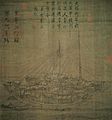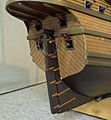Rudder facts for kids
A rudder is a special part used to steer things that move through water or air. Think of it like the steering wheel for a boat or an airplane! It helps ships, boats, submarines, aircraft, and even hovercraft go in the direction their pilot or captain wants.
How the Rudder Was Invented
People have been steering boats for a very long time. Early on, they used large oars placed on the side of their ships. We know this from ancient drawings and models from places like Iran and Ancient Egypt, dating back over 4,000 years ago!
One of the first times we see an oar used for steering at the back (called the stern) of a boat is in an Egyptian tomb. This tomb belonged to a person named Menna, and the drawing is from around 1422-1411 BC. Later, the Romans also used these stern-mounted oars a lot for their river boats.
The modern rudder, which is fixed to the very back of the boat, first appeared in China. A pottery model of a Chinese junk from the 1st century AD (during the Han dynasty) shows this type of rudder. This was about a thousand years before similar rudders were seen in Europe! Travelers later brought this clever idea from China to Europe and the Islamic world during the Middle Ages.
Images for kids
-
A Chinese pottery boat from the Han dynasty (25–220 AD). Notice the rudder at the back!
-
A modern ship rudder (the long red rectangle behind the propeller).
-
The rudder of the famous ship RMS Olympic turned to one side.
-
An old Chinese painting (from the Song Dynasty, 960–1279) showing two large cargo ships with big rudders at their sterns.
-
This pottery boat from the Han dynasty shows one of the earliest known rudders.
See also
 In Spanish: Timón (dispositivo) para niños
In Spanish: Timón (dispositivo) para niños
 | Bessie Coleman |
 | Spann Watson |
 | Jill E. Brown |
 | Sherman W. White |












